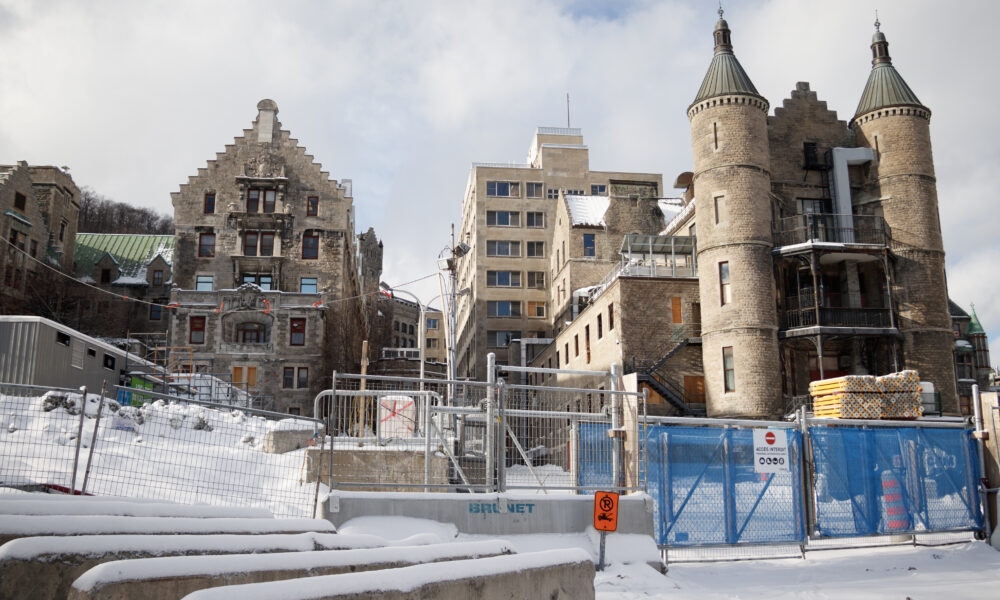Provost and Executive Vice-President (Academic) Christopher Manfredi emailed all students and staff on Dec. 20, providing an update on McGill’s New Vic Project and a “clarification of salient facts.” This came as the Kanien’kehá:ka Kahnistensera’s (Mohawk Mothers) ongoing investigation into the New Vic Project site, where they fear that there may be unmarked graves, continues. The Mothers returned to court on Oct. 27 to refute what they see as McGill and the SQI’s premature disbandment of the court-appointed archaeological panel, and Justice Gregory Moore ruled to reinstate the archaeological panel on Nov. 20. McGill and the SQI have appealed this decision, claiming Justice Moore misinterpreted the settlement agreement, with a planned appeal hearing on Jan. 16.
Manfredi’s email disputed several perceived misconceptions, including the disbandment of the archaeological panel, Historic Human Remains Detection Dogs (HHRDD) detecting human remains on the site, the mishandling of evidence, and the use of student fees to fund McGill’s legal proceedings.
In a written statement to The Tribune, court-appointed Indigenous cultural monitor Karonhia’nó:ron explained that his role on the site includes reminding the defendants—including McGill, the Société québécoise des infrastructures (SQI), the Royal Victoria Hospital (RVH), the City of Montreal, and the Attorney General of Canada—that the investigation should be Indigenous-led, that proper Indigenous protocol must be followed, and that the archaeologists must abide by the settlement agreement and the recommendations of the expert panel. Karonhia’nó:ron expressed that he found Manfredi’s email to be “disgusting and infuriating.”
“The statement that no evidence of human remains has been discovered since the investigation began in June 2023 is despicable and wholeheartedly untrue.” Karonhia’nó:ron wrote. “HHRDD have flagged two separate locations as potentially containing human remains, ground-penetrating radar surveys have detected dozens of anomalies, [and] hundreds of [animal and unknown] bone fragments have been found on-site.”
Karonhia’nó:ron also addressed McGill’s claim that it did not fire the expert archaeological panel, explaining that after the panel submitted its initial recommendations of July 17, 2023, as mandated by articles 11 and 13 of the settlement agreement, one of the panel members resigned. Shortly after, on Aug. 3, McGill and the SQI disbanded the panel.
McGill media relations officer Frédérique Mazerolle explained in a written statement to The Tribune that the panel was dissolved in August as the panel’s mandate—as stipulated by the settlement agreement and contracts provided to panel members—had concluded.
“Its mandate was ‘to assess and identify the appropriate archaeological techniques to be used on different areas of the site to detect whether there are unmarked graves,’” Mazerolle wrote. “Its mandate having been completed, it dissolved, with the understanding that should some unexpected discovery take place on the site, the panel would be consulted.”
Mazerolle additionally expanded on McGill’s decision to appeal Justice Moore’s Nov. 20 decision to reinstate the archaeological panel.
“That ruling addressed the circumstances under which archaeological work on the site of the RVH is to be carried out,” Mazerolle wrote. “Our decision to appeal was not taken lightly and is based on our view that the judgment made legal and palpable errors. Specifically, we believe the Settlement Agreement was misinterpreted in the judgment.”
Karonhia’nó:ron found the appeal to be “repulsive,” expressing that he believes taking the case back to court would be a waste of time and resources.
Manfredi’s email additionally stated that the agreement does not stipulate that the investigation should be Indigenous-led. Phillippe Blouin—an anthropologist and associate of the Mothers—responded to this claim in an interview with The Tribune, expressing that he found it to be improper to pursue an investigation of this sort without Indigenous leadership.
“The government and university really want to take that position that the searches for missing Indigenous and murdered Indigenous children should not be led by the Indigenous community?” Blouin asked. “They want the potential perpetrators of atrocities […] to lead the research. It just doesn’t seem very consistent with international law.”
A previous version of this article stated that Karonhia’nó:ron said that “hundreds of [animal and human] bones” were found on the site. In fact, no confirmed human bones have been found on the site. Animal bones and some bones of unknown origin, which archaeologists believe are animal, have been found. The Tribune regrets this error.
A previous version of this article stated that Mazerolle said that McGill and SQI dissolved the panel as they believed its mandate had ended. In fact, the panel was dissolved when it had met the terms stipulated in its members’ contracts, which were written by McGill. The Tribune regrets this error.









